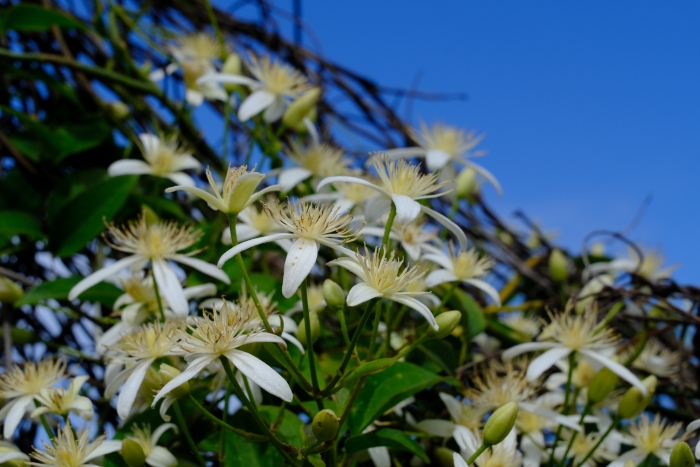Australian Clematis
(Clematis aristata)
Australian Clematis (Clematis aristata)
/
/

Peter Crowcroft
CC BY 4.0
Image By:
Peter Crowcroft
Recorded By:
Copyright:
CC BY 4.0
Copyright Notice:
Photo by: Peter Crowcroft | License Type: CC BY 4.0 | License URL: http://creativecommons.org/licenses/by/4.0/ | Rights Holder: Peter Crowcroft | Publisher: iNaturalist | Date Created: 2022-10-08T13:37:20-07:00 |













Estimated Native Range
Summary
Clematis aristata, commonly known as Australian Clematis or Old Man’s Beard, is a climbing shrub native to moist eucalypt forests, rainforest margins, and stream banks in Southeastern Australia. This deciduous or semi-deciduous plant typically grows vigorously, using its twining petioles to climb over other vegetation. It can reach lengths of up to 3-4 meters. The leaves are usually ternate, with three leaflets, and the plant produces an abundance of star-shaped white or cream flowers from spring to early summer, which are quite showy and attract pollinators. The flowers are dioecious, with male and female flowers on separate plants, and they give way to feathery seed heads that resemble an old man’s beard, hence the common name.
Australian Clematis is valued for its ability to cover unsightly structures quickly and for its attractive flowers and seed heads. It is used in gardens for trellises, pergolas, and as a screening plant. It thrives in semi-shaded positions and requires well-drained, deep soils rich in organic matter. While it can tolerate a range of soil pH, it prefers a slightly acidic to neutral pH. Regular watering is necessary, especially during dry periods, but overwatering should be avoided. Pruning is essential to control its size and to promote more prolific blooming. It is generally free from serious pests and diseases, but it can be susceptible to clematis wilt, a fungal disease that causes sudden wilting and death of stems.CC BY-SA 4.0
Australian Clematis is valued for its ability to cover unsightly structures quickly and for its attractive flowers and seed heads. It is used in gardens for trellises, pergolas, and as a screening plant. It thrives in semi-shaded positions and requires well-drained, deep soils rich in organic matter. While it can tolerate a range of soil pH, it prefers a slightly acidic to neutral pH. Regular watering is necessary, especially during dry periods, but overwatering should be avoided. Pruning is essential to control its size and to promote more prolific blooming. It is generally free from serious pests and diseases, but it can be susceptible to clematis wilt, a fungal disease that causes sudden wilting and death of stems.CC BY-SA 4.0
Plant Description
- Plant Type: Vine
- Height: 12-15 feet
- Width: 2-15 feet
- Growth Rate: Moderate
- Flower Color: White
- Flowering Season: Summer
- Leaf Retention: Evergreen
Growth Requirements
- Sun: Full Sun, Part Shade
- Water: Medium
- Drainage: Medium
Common Uses
Butterfly Garden, Low Maintenance, Potted Plant, Showy Flowers
Natural Habitat
native to moist eucalypt forests, rainforest margins, and stream banks in Southeastern Australia
Other Names
Common Names: Old Man’s Beard , Goat’s Beard , Mountain Clematis , Toothed Clematis
Scientific Names: Clematis aristata , Clematis aristata , Clematis aristata f. elliptica , Clematis aristata f. oblongisepala , Clematis aristata f. stenosepala , Clematis aristata subsp. confertissima , Clematis aristata subsp. normalis , Clematis aristata subsp. pubescens , Clematis aristata var. breviappendiculata , Clematis aristata var. browniana
GBIF Accepted Name: